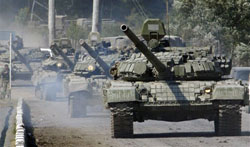| Home | Blog | Ask This | Showcase | Commentary | Comments | About Us | Contributors | Contact Us |

Remember the Caucasus?ASK THIS | June 08, 2011Three years after the brief war between Russia and Georgia, the still-smoldering conflict there has the potential to reignite as a political issue in both countries in 2012, an expert on the region writes. By Thomas de Waal The Caucasus in general and Georgia in particular are important to the wider world because they still comprise a potential zone of conflict. The effects of any future conflict would be felt a long way outside the region, as happened in 2008. Georgia is also the main contested area in the U.S.-Russian relationship and a new crisis there has the potential to make Russia more authoritarian and damage cooperation between Moscow and Washington on a range of international issues.
Q. Do we know more now about how the August 2008 war began?
Yes. The picture is clearer than it was at the time. A report commissioned by the EU and compiled by Swiss diplomat Heidi Tagliavini apportions blame to both Georgia and Russia. The report shows that the Georgian government “fired the first shot” on the night of August 7, when its forces attacked the South Ossetian city of Tskhinvali -- but also that Russia had been provoking the Georgian side and quickly responded with disproportionate force. Georgian government claims that it acted because a Russian armored column was entering South Ossetia on the evening of August 7 have not been substantiated. They are not mentioned in U.S. diplomatic cables from the first few days of the war released by Wikileaks.
Q. Has the six-point ceasefire plan been implemented?
On August 12, 2008, French president Nicolas Sarkozy negotiated a ceasefire to end the hostilities that began on the night of August 7-8. The fifth point reads: “The Russian armed forces will be pulled back on the line, preceding the start of hostilities.” All the other points in the plan were implemented but this one glaringly stands out. In particular, Russian forces remain in and around Akhalgori, a town with a predominantly ethnic Georgian population, which is only about 25 miles from the Georgian capital Tbilisi. The status of Akhalgori is disputed: Russians and Ossetians call it by its old Soviet name, Leningori, and say it lies within South Ossetia. Georgians say it is not part of South Ossetia. What is not disputed is that Russian forces were not there prior to the start of hostilities, and should be withdrawn if the ceasefire agreement is to be respected. In response to this the Russians argue that since the ceasefire agreement was signed, “new realities” have emerged on the ground and that they have recognized South Ossetia as an independent country.
Q. What is going on with negotiations over Georgia’s breakaway regions?
Georgia and Russia still have no diplomatic relations and are in what looks like a permanent dispute over Abkhazia and South Ossetia, which Russia has recognized as independent but most of the world still regards as de jure part of Georgia. If the conflicts over these two regions are ever to be resolved, it will be a long haul. Little has changed on the ground. Ongoing international talks in Geneva have achieved a reduction of instability on the borders but have made no progress on any political issues. As far as the current populations in Abkhazia and South Ossetia are concerned, there is little incentive to negotiate because Russia has “resolved” the conflict by recognizing them as independent and allowing them to secede from Georgia.
Q. What is Georgia’s strategy?
In Georgia, opinion polls show that economic concerns, in particular unemployment and rising prices, have replaced the conflicts in Abkhazia and South Ossetia as the main issues for voters. The Georgian government now makes the argument that it does not have a conflict with Abkhazia or South Ossetia but that these are “occupied territories” under the control of Russia and that therefore its conflict is now with Moscow. Georgia’s main strategy is therefore to press internationally for the “de-occupation” of Abkhazia and South Ossetia. The Georgians were pleased when the U.S. secretary of state called the two regions “occupied territories.” However the European Union has not followed suit and its strategy is one of “non-recognition and engagement,” focused on promoting activities inside the two regions.
The Georgian government has approved two documents on the conflict regions. One, the Law on Occupied Territories, is very restrictive and seeks to constrain almost all activities not directly approved by the Georgian government in Abkhazia and South Ossetia. The other is more progressive and is entitled The State Strategy on Occupied Territories: Engagement through Cooperation. It approves people-to-people contacts across the administrative borders of Abkhazia and South Ossetia. However, the modalities later attached to the strategy put conditionality on international projects there which will make engagement quite difficult in practice.
Q. What is life like inside South Ossetia and Abkhazia?
South Ossetia and Abkhazia are often lumped together as Georgia’s two breakaway regions, but are actually very different cases. South Ossetia is a small, agricultural region which is very much part of Georgia’s geographical space. It holds no strategic interest for Russia except as a forward military base threatening Tbilisi. A June 2010 report by the International Crisis Group paints a miserable picture of South Ossetia since 2008, with a population no higher than 30,000 people, rising prices and the Russian military being the main provider of jobs. That suggests than in the long run a deal can be made in which South Ossetia restores economic and political links with Georgia even if it is not re-integrated fully into the Georgian state.
Abkhazia much more resembles a proto-state. It has a larger population of 200,000 to 250,000, although that is less than half the number it had before the 1992-93 war, as a result of which the ethnic Georgian population fled or was driven out. It has a long Black Sea coastline which makes it an attractive tourist destination. It is situated next door to Sochi, the site of the 2014 Winter Olympics. For Abkhazia, Russian recognition has also been a mixed blessing, resolving its security issues with Georgia but also speeding up de facto annexation by Russia. Russia now controls all major economic assets in Abkhazia and provides Abkhazia with its only open border. This means that, paradoxically, Abkhazia is more isolated from the rest of the world than it was before Russian recognition.
Q. How are Georgian-U.S. relations?
In 2005-08, following President George W. Bush’s speech in Freedom Square in Tbilisi, there was a very close relationship between the U.S. and Georgian administrations and Mikheil Saakashvili’s Georgia was a role model for President Bush’s “freedom agenda.” After the disappointments of the 2008 war the relationship inevitably cooled. President Obama’s decision to focus on a “reset” policy with Moscow worried many Georgians, but the overall evidence is that it has stabilized the situation in and around Georgia. Currently, relations between Washington and Tbilisi could be called friendly but pragmatic. Georgia proves its pro-American credentials by supplying the second largest contingent of troops to Afghanistan on a per capita basis, but it has also set down a marker that it will choose a more balanced foreign policy, by for example establishing a visa-free regime with Iran.
The main point of controversy is over weapons sales. The Georgians complain that they do not have enough weapons to defend themselves properly and that they are under an informal arms embargo from the United States. The U.S. denies there is an embargo but official statements suggests the government is indeed wary about selling arms to Georgia and believes security in the region is better guaranteed by not doing so. This leaves Georgia looking around for other potential arms sellers. Israel, which did supply weapons before the 2008 war, is unlikely to do so again because of pressure from Moscow and two bilateral disputes with Georgia.
Q. Is there a risk of renewed conflict?
There is no rational reason to expect a new Georgian-Russian conflict. Georgia is weak and constrained by its Western partners from another military operation. Russia has de facto control over Abkhazia and South Ossetia and no reason to move beyond the borders of those two territories and remind the world about the events of 2008. Despite fears that 2008 marked a resurgence of “Russian neo-imperialism” in the post-Soviet space, the evidence suggests that Abkhazia and South Ossetia were special cases for Russia and not a precedent for interventions elsewhere.
Rationality does not always win the day in this part of the world, however, and a certain risk of violence on the ground remains. U.S officials say that intensive telephone diplomacy in the summer of 2009 with Moscow and Tbilisi helped avert another crisis. Both Georgia and Russia enter election seasons in 2012 and might be tempted to use the smoldering conflict with the other as a domestic political card. The situation in Russia’s mainly Muslim North Caucasus, which is worsening once again, could be an opportunity for both pragmatic cooperation between Georgia and Russia -- or it could bring increased hostility. A recent Georgian initiative to open up the North Caucasus had several positive elements but was undertaken without consultation with Moscow and was seen by Russia as a provocation.
|
|
||||||||||||||||
© 2025 by the President and Fellows of Harvard College




